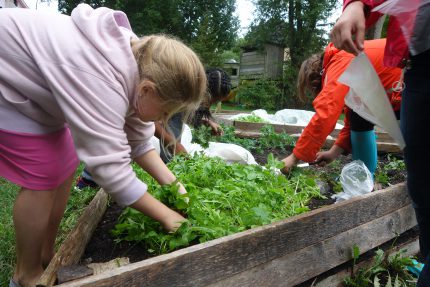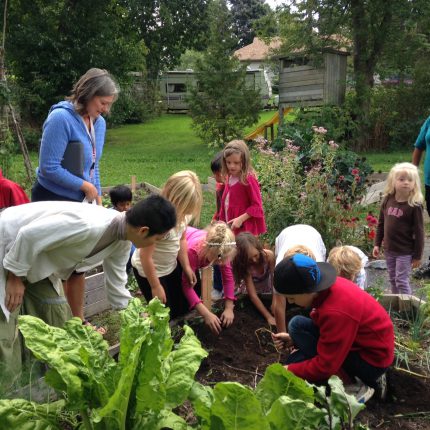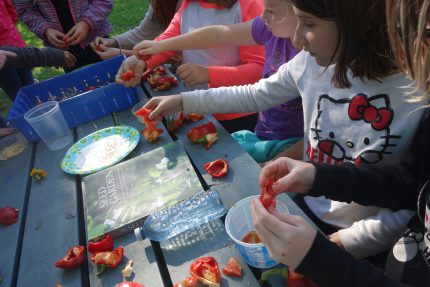Ontario Farm to School Inspiration: Marysville Public School
Posted: January 17, 2017
Categories: Edible Education Network / GoodFoodBites / News from Sustain Ontario / Schools
 Canada’s 3rd Annual National Farm to School Month, led by Farm to Cafeteria Canada (F2CC), was held throughout the month of October 2016.
Canada’s 3rd Annual National Farm to School Month, led by Farm to Cafeteria Canada (F2CC), was held throughout the month of October 2016.
A number of schools submitted Farm to School stories to F2CC as part of the month’s #ThinkandEatLocalatSchool contest. Here is the second of the stories that we’re sharing as inspiration for 2017!
Marysville Public School shared the following on how they engage in thinking and eating local at school:
MPS SCHOOL GARDEN PROJECT 2016
In the winter of 2016 the Wolfe Island Community Garden group initiated a project that partnered the Community Garden group with the Parents’ Council and the senior class (Grade 4 – 8) at Marysville Public School.
Students participated in the project for one period a week from mid February to the end of June and then again from mid September to the end of October. Students learned about the importance of growing food, both in the classroom and through hands-on learning in the garden. Volunteers from the community came to assist the students in the garden through out the season and were instrumental in maintaining the garden during the summer.
The garden was designed to grow as large a variety of vegetables as possible and to have a usable harvest in late spring and through out the fall for the existing Parent Council-run weekly Hot Lunch program at Marysville Public School.
Summer vegetables were shared among the volunteers. Students spread compost, planted, watered, weeded, and harvested. Many small student projects were also accomplished throughout the year including:
- Creating an asparagus bed using an old canoe that had been donated to the garden for decoration
- Creating two small enclosed beds in which strawberries were planted
- Building a large bed on the south side of the shed in which grape vines, donated by a local experimental vineyard, were planted
- Creating a small rhubarb patch
- Improving the garden shed, putting up shelves and hangers for tools, and eavestroughs and barrels for rainwater collection.
- Building a second compost bin
- Successfully writing a letter to Pyke’s farm asking for a donation of compost for the garden
- Measuring the existing raised beds and estimating the volume of soil needed to top up these beds
- Learning about the importance of saving seed and saving seed from heritage carrots and beets, kale, spinach, onion, coriander and dill. With a guest speaker Kathy Rothermel of the Kingston and Area Seed Saving Initiative (KASSI), the students saved pepper and squash seeds in Fall.
- The primary class (JK – Grade 3) students visiting at the Garden to harvest potatoes that were used for ‘leek & potato soup’ lunch.
- Creating a special tulip garden for the occasion of Canada’s 150th anniversary. Students dug an area and planted 150 bulbs that make the Canadian flag.
 Several parents commented that their children were really excited about the project and that they encouraged their parents to have gardens of their own. The garden was well maintained and productive and established itself as a place for people to meet regularly. Volunteers, teachers and staff, and children all worked together and got to know one another and a sense of community was created.
Several parents commented that their children were really excited about the project and that they encouraged their parents to have gardens of their own. The garden was well maintained and productive and established itself as a place for people to meet regularly. Volunteers, teachers and staff, and children all worked together and got to know one another and a sense of community was created.
Many thanks to Marysville Public School for sharing their story! Also in this series, check out our first post, Ontario Farm to School Inspiration: Kingsville Public School.
Stay Tuned – stories from Farm to School Month 2016 will continue to be posted on the Sustain Ontario Blog.
4 responses to “Ontario Farm to School Inspiration: Marysville Public School”
Leave a Reply
You must be logged in to post a comment.

[…] Ontario Farm to School Inspiration: Marysville Public School […]
[…] Ontario Farm to School Inspiration: Marysville Public School […]
[…] MPS is on the Sustain Ontario’s news! […]
[…] Check out how Marysville Public School is getting students engaged in local food education […]